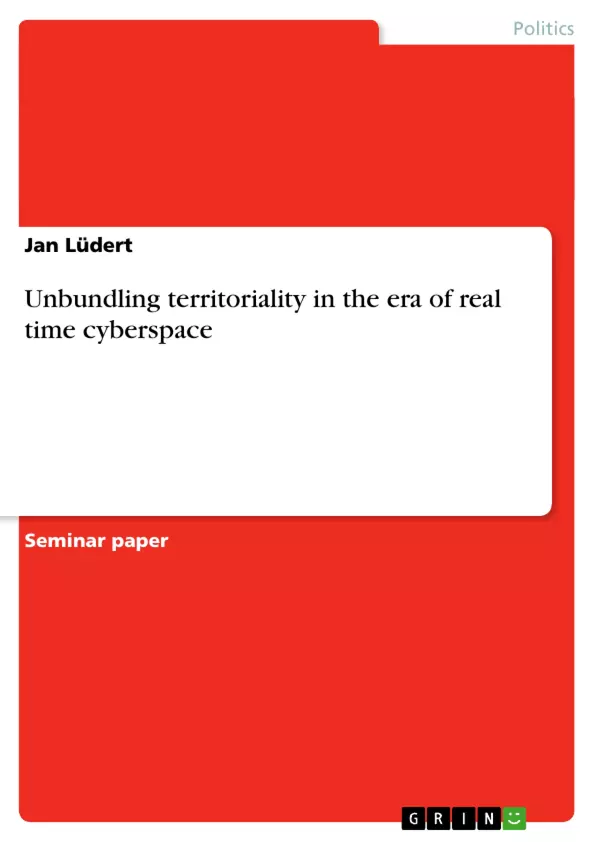1993 when Ruggie termed the ‘unbundling of territoriality’ was a year in which
knowledge and communication that is its accessibility and dissemination entered a
new realm of space and time. On the 30th of April 1993 the World Wide Web and its
underlying technology was made freely available to use by anyone. Today over one
billion people use the Internet, or every sixth person on the planet. A collective brain
one might say is forming in front of our eyes growing with every new person entering
three W’s into a web browser.
While Ruggie aimed to search for, and investigate into, a fundamental transformation
of the modern system of states, he emphasized that such an analysis would find a
fruitful starting point in the [re]conceptualisation of territoriality. This paper will
utilize Ruggie’s concept, by applying its analysis to the emerging and manifesting
space-time implosion driven by the Internet and other communication technologies.
Therefore, it is argued that Cyberspace provides a practical sphere to investigate into
the unbundling of territoriality in a postmodern world. In the first section the impact on territoriality resulting from the emergence of the
Cyberspace will be discussed. Ruggie’s model of differentiation between systems of
rule and territory is applied to explain the transformation of territory in the
postmodern era of Cyberspace. It is followed by an investigation into the
consequences of Cyberspace on sovereignty. Showing that Cyberspace does indeed
provide a new stage in Ruggie’s terms, facilitating an unbundling and relocation of
sovereignty away from state territory. The third section discusses the implication of
the virtual space on the rise and acceleration of globalisation. It is argued that
globalisation, could not be perceived as a postmodern phenomenon without the
Cyberspace revolution. The last part of the paper, proposes the need to rethink the
notion of movement in the age of virtual and real spaces. Cyberspace allows ‘tourists’
in line with Bauman’s description to choose between virtual and real movement. The
preceding discussion will finally lead to the conclusion that the conceptualisation of
Cyberspace as one aspect responsible for the unbundling of territory provides an
important explanatory insight into the transformation from modernity to
postmodernity.
Inhaltsverzeichnis (Table of Contents)
- Cyberspace’s impact on territoriality
- Ruggie’s model of differentiation between systems of rule and territory
- The emergence of virtual communities
- The impact of Cyberspace on state control
- Sovereignty @ Cyberspace
- The reconfiguration of state sovereignty
- The dynamic evolution of sovereignty
- Globalisation driven by Cyberspace
- Deterriotorialization
- Increasing social interconnectedness
- Increased speed and velocity of human interaction
- A long-term process
- Multi-pronged process
- Moving in Cyberspace
- Conclusion
Zielsetzung und Themenschwerpunkte (Objectives and Key Themes)
This paper aims to investigate the impact of Cyberspace on the concept of territoriality, analyzing its consequences on sovereignty, globalisation, and human movement in the postmodern era. The paper utilizes Ruggie’s model of the "unbundling of territoriality" as a framework to understand how Cyberspace has reshaped the dynamics of world politics.
- The unbundling of territoriality in the age of real-time Cyberspace
- The impact of Cyberspace on sovereignty and its reconfiguration
- The role of Cyberspace in driving globalisation
- The influence of Cyberspace on human movement and the distinction between real and virtual motion
- The potential of Cyberspace to democratize or lead to an Orwellian nightmare
Zusammenfassung der Kapitel (Chapter Summaries)
The paper examines the impact of Cyberspace on territoriality, drawing on Ruggie’s model of the "unbundling of territoriality." It argues that Cyberspace creates novel forms of political community, where state territory and sovereignty are reconfigured. The paper explores the emergence of virtual communities, the challenges to state control, and the potential for democratization or Orwellian control.
The second section focuses on sovereignty and its relationship to Cyberspace. It argues that Cyberspace does not eliminate sovereignty but rather reconfigures it. The paper highlights the dynamic evolution of sovereignty and the need to reevaluate its traditional understanding.
The third section investigates the role of Cyberspace in driving globalisation. It examines five key processes associated with globalisation, all of which rely on Cyberspace technologies. The paper argues that globalisation has entered a postmodern period, with Cyberspace providing a new stage for political interaction.
The fourth section analyzes the impact of Cyberspace on human movement. It explores how Cyberspace has shifted certain forms of activity from the real to the virtual space. The paper discusses the concept of “tourists” in Cyberspace and the blurring of boundaries between real and virtual spaces.
The conclusion summarizes the paper’s findings, emphasizing the significance of Cyberspace in reshaping world politics, sovereignty, globalisation, and human movement. It highlights the potential for both positive and negative consequences of Cyberspace and the importance of democratic control over this evolving digital space.
Schlüsselwörter (Keywords)
The main keywords and focus topics of this paper include: unbundling of territoriality, Cyberspace, sovereignty, globalisation, virtual communities, state control, human movement, real and virtual spaces, democratization, Orwellian nightmare.
Frequently Asked Questions
What does the 'unbundling of territoriality' mean?
Coined by John Ruggie, it refers to the process where political rule and social interaction are no longer strictly tied to physical borders, a shift accelerated by Cyberspace.
How does Cyberspace affect state sovereignty?
Cyberspace doesn't eliminate sovereignty but reconfigures it, relocating some aspects of control away from traditional state territory towards virtual networks.
Is globalization possible without Cyberspace?
The paper argues that modern, postmodern globalization is fundamentally driven by the real-time communication and interconnectedness provided by the Internet.
What is the concept of 'movement' in the digital age?
In the age of Cyberspace, individuals (often called 'tourists') can choose between physical movement and virtual movement, blurring traditional spatial boundaries.
Can Cyberspace lead to an 'Orwellian nightmare'?
The text discusses the dual potential of Cyberspace to either democratize global politics or facilitate extreme state control and surveillance.
- Quote paper
- Jan Lüdert (Author), 2006, Unbundling territoriality in the era of real time cyberspace, Munich, GRIN Verlag, https://www.grin.com/document/90025



